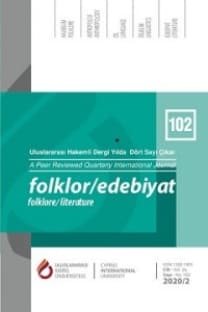Siber Kültür ve Sosyal Oyunlar: Karşılaştırmalı Örneklerle Sosyal Oyun Deneyimi Üzerine Bir Çözümleme
İnternetin bilgisayar oyunu dünyalarının bir parçası haline gelmesi, sadece oyun deneyimini daha sosyal bir şeye dönüştürmek suretiyle değiştirmemiş, aynı zamanda yaygın siber kültürün temel bileşenlerinden biri olarak ele alınabilecek yeni bir sosyal oyun kültürünü de ortaya çıkarmıştır. Sosyal, kültürel, psikolojik ve ekonomik boyutları nedeniyle ve online oyunların ve bu sanal dünyalara katılanların sayısındaki büyük artışla birlikte, söz konusu oyunlar birçok soruyu beraberinde getirmiş ve çeşitli disiplinlerin ilgi alanına giren meseleler üretmiştir. Online bir oyun oynamak sadece oyun oynama deneyimi değildir aynı zamanda çoğunlukla diğer oyuncularla paylaşılan sosyal bir deneyime de işaret eder. İnternet şüphesiz yaşamlarımızı değiştirmiş, bizlerin etkileşime girme ve iletişim kurma biçimlerimizi derinden etkilemiştir. İnternet kaçınılmaz olarak bilgisayar oyunlarını da etkilemiştir. İnternetin doğası nedeniyle, farklı sosyal grup, kültür ve memleketlerden oyuncuların bir oyun deneyimini paylaşmasına izin veren online oyunların üretilmesinin çeşitli sosyal yansımaları olmuştur. Bugün, internet üzerinde oynanan kağıt oyunlarını, tahta oyunlarını sosyal paylaşım sitesi oyunlarını, savaş oyunlarını ve çok sayıda diğer rol oynama oyunlarını da kapsayan, çok çeşitli online sosyal oyunlar mevcuttur. Sosyal bir fenomen olarak online sosyal oyun deneyimi ve sonuçları üzerine çözümlemeleri içeren bu makalede, çok popüler bir sosyal paylaşım sitesi oyunu ve çok popüler bir Devasa Çok Oyunculu Online Rol oynama Oyunundan (MMORPG) karşılaştırmalı örneklere yer verilmiştir.
Anahtar Kelimeler:
Siber kültür, Siber uzay, Sosyal Oyun Deneyimi, MMORPG, Sosyal Paylaşım Siteleri
Cyberculture and Social Games: An Analysis on Social Gaming, through Comparative Illustrations
The integration of Internet into the computer game worlds not only has changed the gaming experience especially by turning it something more social, but it has also created a new type of social game culture which can be considered as one of the major components of the extensive cyberculture. Due to their social, cultural, psychological and economic dimensions and with the extensive growth of online games and the increase in the number of players joining these virtual worlds, these games raise many questions and produce several issues that have come into consideration for several disciplines. Playing an online game is not merely a gaming experience but it mostly also refers to a social experience shared with other players. The Internet by all means has changed our lives and influenced deeply the ways we interact and communicate. Internet also inevitably affected the computer games. Due to the nature of the Internet, the creation of online games, which allow players from different social groups, cultures and countries share a gaming experience, has several social repercussions. Today there is a wide range of online social games on the Internet, including multiplayer board games, card games, social network games, war games, and many other role playing games. This paper which includes analyses on online social gaming as a social phenomenon and on its consequences, involves the comparative illustrations of a social networking web game and a Massively Multi-Player Online Role Playing Game (MMORPG) which are vastly popular social games.
Keywords:
Cyberculture, Cyberspace, Social Gaming, MMORPG, Social Networking Websites.,
___
- Bell, David, (2001) Introduction to Cybercultures, Florence KY:Routledge.
- Brignall, Thomas W. and Van Valey Thomas L., (2007) “An Online Community as a New Tribalism: the World of Warcraft” Proceedings of the 40th Annual Hawaii International Conference on System Sciences (HICSS’07) IEEE IEEE Computer Society Press
- Dahlberg Lincoln, (2001) “Computer-Mediated Communication and The Public Sphere: A Critical Analysis”, Journal of Computer Mediated Communication, Vol: 1(7) (e-journal: 29.07.2012
- Ege, Göknur and Nicholas Koullapis. (2011) “The Social Context of Online Gaming:An Analysis on the Social Relations among “Warcraft” Players” Sosyoloji Dergisi, Sayı 25, s.19-38.
- Ege, Göknur and Nicholas Koullapis. (2009) “Social Nature of Time and Space in Online Games: Designing Fantastic Social Worlds” The Real and The Virtual: Critical Issues in Cybercultures, D Riha and A.Maj (ed.), Oxford: Interdisciplinary Press, p.109-118
- Jenkins Henry and Kurt Squire. (2003) “Harnessing the Power of Games in Education”, Insight, 1(3): 5-33
- Louis, Leung, (2003) ‘Impacts of Net-generation Attributes, Seductive Properties of the Internet, and Gratifications-Obtained on Internet Use’, Telematics and Informatics, 20(2):107–129
- Lyon, David, (1997) Elektronik Göz. Çev.: Dilek Hattatoğlu, İstanbul:Sarmal Yayınevi.
- Rheingold, Howard (1991) The Virtual Community: Homesteading on the Electronic Frontier Menlo Park, CA: Addison-Wesley
- Riegle Rod and Matejka Wes ley, (2006) “The Learning Guild: MMORPGs as educational environments”, paper presented at 22nd annual conference on distance Teaching and Learning, e-proceedings, University of Wisconsin
- Roberts D. Lynne and Malcolm Parks (2001) “The Social Geography of Gender Switching in virtual Environments on the Internet” Virtual Gender. Eileen Green and Alison Adam (ed.), Routledge, pp. 265-285,
- Susaeta, Heinz, Felipe Jimenez, Miguel Nussbaum, Ignacio Gajardo, Juan José Andreu and Marco Villalta (2010) “From MMORPG to a Classroom Multiplayer Presential Role Playing Game”, Educational Technology & Society, 13 (3):257–269.
- Tapscott, Don (1997) Growing Up Digital: The Rise of the Net Generation, OH:McGraw- Hill Companies, Blacklick
- ISSN: 1300-7491
- Başlangıç: 1994
- Yayıncı: -
Sayıdaki Diğer Makaleler
“Oturduğu Yerden Antropoloji”: Doryo’larda Siberetnografiyi Düşünmek
SANAL KÜLTÜR: YANILSAMA MI, GERÇEKLİK Mİ?
İNTERNETTEKİ ŞİRİNCE: SİBER DÜNYANIN “GERÇEKLİĞİ”
Türkiye’de İnternet, Kamusallık ve Demokratik Kanaat Oluşumu
Burak ÖZÇETİN, Umut Tümay ARSLAN, Mutlu BİNARK
Bir Siberdrama Biçimi Olarak Dijital Oyun: ‘Alice Harikalar Diyarında’ Örneği
